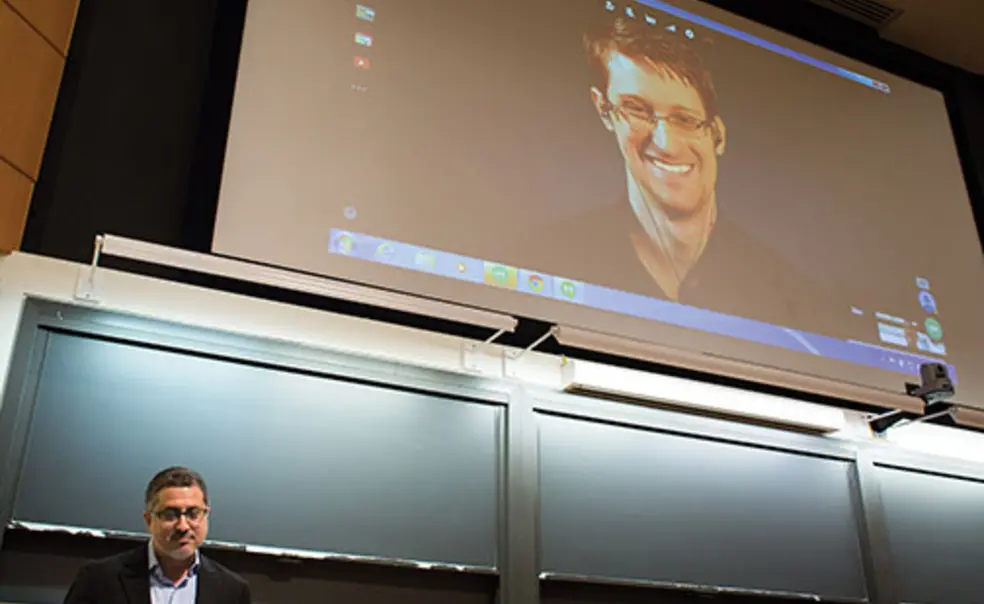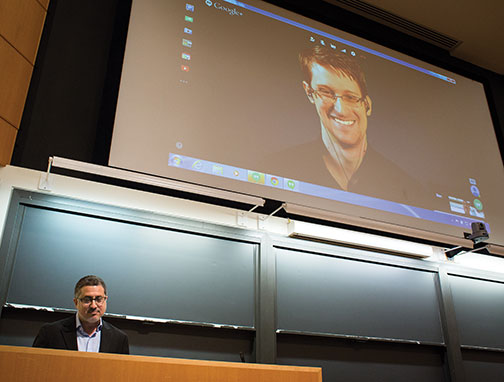Talking to Snowden
Q&A focuses on encryption, privacy rights; conference analyzes impact of disclosures
Citizens must assert their right to privacy in the face of vast government surveillance efforts, former National Security Agency contractor Edward Snowden told a large Princeton audience last month. Snowden, who gained temporary asylum in Russia in 2013, appeared via video link, his face projected onto a giant screen as he gazed into a webcam in Moscow.
Snowden arrived in Russia soon after leaking to journalists a trove of classified documents revealing that the American government was secretly collecting vast quantities of data on telephone and Internet use. He faces criminal espionage and theft charges that could send him to prison for decades.
More than 350 people packed the Friend Center auditorium and spilled into two nearby overflow rooms May 3 to hear Snowden, a boyish-looking 31-year-old in rimless glasses, interviewed by Pulitzer Prize-winner Barton Gellman ’82, a Woodrow Wilson School lecturer and one of the journalists who received Snowden’s leaks.
Audience members, many of them current or former Princeton students, asked Snowden about the NSA programs whose existence he revealed and sought his advice on how citizens could protect threatened freedoms.
“Defend your right to encryption and your right to privacy,” Snowden urged. “Rights aren’t really granted by governments. These are things that are inherent to human nature. If the government wants to intrude on your rights, you don’t have to justify why you need [those rights]. You make it incumbent on them to justify their intrusion into your rights.”
About 100 people stayed on for an afternoon conference, “Now That We Know: Technology, Law, Journalism, and Policy After Snowden,” listening as a dozen experts discussed the implications of the Snowden revelations. The day’s events were co-sponsored by the Center for Information Technology Policy, the Program in Law and Public Affairs, and the Wilson School.
Conference speakers agreed that Snowden’s disclosures, coupled with new legal pressures on journalists and their sources, have remapped the world of electronic privacy, pushing everyone from technology companies to newspaper reporters to adopt new methods of protecting data from government scrutiny.
The event took place the week before a federal appeals court in New York ruled that the NSA’s bulk collection of Americans’ phone records was illegal.
Gellman, the lead speaker on the conference’s journalism panel, said he spends more and more time covering his tracks — encrypting communications or leaving cell phones and GPS devices behind when he meets with sources. “When you treat talking to a source as a kind of espionage, then you force reporters to try to learn how to behave more like spies,” he said.
And ongoing government efforts to dilute encryption protocols by requiring technology companies to build in “back-door” access to coded communications will ultimately weaken Internet security for Americans and empower repressive governments around the world, conference speakers said.
Snowden’s disclosures point up the need for computer scientists to involve themselves in influencing public policy on surveillance, said Jonathan Mayer ’09, a lawyer and computer science graduate student who is a fellow at Stanford University’s Center for International Security and Cooperation.
“Good surveillance law requires good technical understanding,” Mayer said. “I don’t think the problem is rule-breaking. I think the problem is that the rules themselves are deeply broken.”
Even the NSA has not argued strongly against a bill, pending in Congress in mid-May, that would tighten post-9/11 rules governing the bulk collection of data, conference speakers said, since little or no evidence indicates that this mountain of data has yielded any nuggets of useful information.
In his conversation with Gellman, Snowden said that mass surveillance of electronic communications compromises fundamental American values without making the country safer.
Compiling massive databases of so-called “metadata” about communications — such details as when and where a telephone call was made, or how long it lasted — gives security services access to information about millions of people who are not suspected of any crimes, he noted.
“That’s called pre-criminal investigation, and that’s never been a standard in any liberal democracy,” Snowden said. “They’re not wrong that it would give them an investigative advantage, but that’s not the way that liberal societies work.”













2 Responses
James Robertson ’59
10 Years AgoSnowden's Appearance
PAW’s breezy piece on the videolink star-turn of a smiling Edward Snowden before a “packed Friend Center auditorium and two overflow rooms” in early May (On the Campus, June 3) invites comparison with the University’s very different reaction to Alger Hiss’ appearance on campus in the spring of 1956.
Hiss had been convicted of perjury about his involvement in espionage for the Soviet Union. The very idea that he would be given a podium at Princeton was anathema to many alumni, who withheld Annual Giving. Father Hugh Halton called the University a center of “moral and political subversion.” Little toy pumpkins appeared on campus, to remind us of Whittaker Chambers. National media (and The Harvard Crimson) had a field day with the story. President Harold Dodds *14 was strongly critical of Whig-Clio for having the bad judgment to invite Hiss and made known his own “contempt” for the man.
Snowden, on the other hand, apparently was greeted with virtual palm leaves and huzzahs, uncritically, like a hero, without a peep from Nassau Hall.
This is not the Messiah. This is a man who deliberately and systematically violated his oath and released hundreds of thousands of pages of super-sensitive, highly classified national-security information. Yes, he started an important national debate that needs to happen, but he is also a fugitive from justice, hiding in Russia to avoid arrest, extradition, trial, conviction, and prison. Was none of those enthusiastic students disturbed enough by Snowden’s bland, smiling, big-screen presence — or by the support of others who may have aided and abetted his unlawful acts — to protest just a little?
Randolph Hobler ’68
10 Years AgoVindicating Snowden
James Robertson ’59 bemoans the lack of any protest by Princeton students against Edward Snowden (Inbox, July 8). He is missing the bigger picture, which I’m sure is what those Princeton students understood. If abuses are massive enough, pervasive enough, and dangerous enough, thoughtful moral individuals find themselves at a crossroads of history where one small act of civil disobedience can right great wrongs affecting millions. This is precisely what Rosa Parks did in the face of immoral Jim Crow laws; what Claus von Stauffenberg tried to do in the assassination attempt on Hitler; what Daniel Ellsberg did with the Pentagon Papers; and what Snowden did in exposing the unconstitutional, widespread, secret abuses of the NSA that affected not only every single American, but millions overseas as well. (And God help us what would have happened in the future if he hadn’t blown the whistle.) All of them were breaking laws. To be logically consistent, Mr. Robertson must insist we find fault with them all.
In the meantime, the Snowden vindications have only just begun, with court rulings and a federal law curbing such abuses passed by Republicans and Democrats alike.